Third Week of Advent
An Act of Strength
Download Devotional Bahasa Indonesia Mandarin Chinese (普通話)
The Sacrament of Christmas
By Howard Thurman
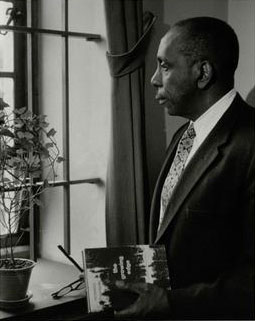
Howard Thurman From the Howard Thurman and Sue Bailey Thurman Collections, Howard Gotlieb Archival Research Center at Boston University
I make an act of faith toward all humankind,
Where doubts would linger and suspicions brood.
I make an act of joy toward all sad hearts,
Where laughter pales and tears abound.
I make an act of strength toward feeble things,
Where life grows dim and death draws near.
I make an act of trust toward all life,
Where fears preside and distrusts keep watch.
I make an act of love toward friend and foe,
Where trust is weak and hate burns bright.
I make a deed to God of all my days —
And look out on life with quiet eyes.
Reflect
We are halfway to Bethlehem, the House of Bread, and it’s time to pause and reflect on the journey so far. What acts of faith have you shown others that have chased away doubts? What acts of joy have brought laughter to heavy hearts? This week, as we light the Advent candles and bake, share and eat our bread, let us meditate on the strength of God’s Son, a gift to humankind, which gives to us when life grows dim.
Pray
God of light and hope, life has a way of beating us down: so many people hurting, so many children hungry, and so many dying. But in you we find our strength. In you, we see that in the deepening darkness, your light shines brighter. We are never alone. We turn to you and ask boldly, O God, to restore us this day. In Jesus’ name, we pray. Amen.
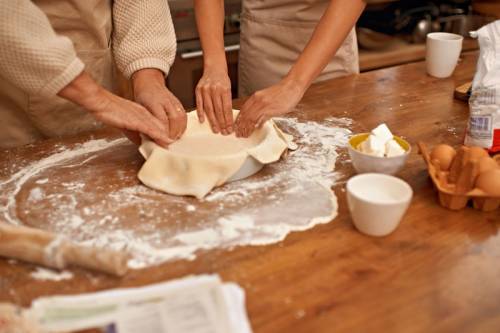 Day 15 | Third Sunday of Advent, Dec. 12
Day 15 | Third Sunday of Advent, Dec. 12
The pie maker
Surely God is my salvation; I will trust, and not be afraid, for the Lord is my strength and might; he has become my salvation. With joy you will draw water from the wells of salvation. And you will say in that day: Give thanks to the Lord, call on his name; make known his deeds among the nations; proclaim that his name is exalted. — Isaiah 12:2–4
Over the course of our time together, I and my open-hearth cooking companions found a rhythm to our days. The awkwardness of being strangers eased as we shared stories while chopping, measuring and mixing at the well-worn wooden table that had many stories to tell if its aged slabs could talk. We fell into roles we were good at: wood collector, fire maker, dough kneader, dishwasher, etc. The instructor, though, noticed we were getting too comfortable and decided to challenge us.
You can guess where this is going. Challenging those who are comfortable rarely goes well, especially if you have the job title of “premier piecrust maker.” Yes, one of our cooking companions — who boasted how she had spent an entire summer at a historic site showcasing 18th-century kitchen skills — had to relinquish making the crusts for our savory meat pies that day. Instead, she would tend to the smoky fires. The piecrusts would be made by an older man who had failed several times already in making a buttery, light crust.
So, there he was at the old table clumsily working the butter and flour, with the piecrust queen looking over his shoulder remarking: “Don’t work it too much.” “Don’t add more flour.” “Is the water cold? It has to be cold.”
The man’s already drooping shoulders sunk a bit more with each critique. When his finished pastry wasn’t enough to fill the pan — and before any comment could be made — I swooped in with a smaller pan in hand and exclaimed, “Awesome! I’ve wanted to use this pan, and now you made the perfect crust to fit it!” His shoulders straightened with a newfound sense of worth, and he smiled back at me. That meat pie with a crust like lead was the worst I had ever tasted. But that night, gathered around a lone candle burning on the old table, no one admitted it. We washed down big mouthfuls with cider and applauded the effort of this man who was eager to get back to the job he was good at: tending the fires.
Living in community is not easy. We fall into roles that we think only we can do, never daring to branch out and try something new. Not only do we have our own special roles, but we get territorial if anyone dares to encroach on our area of expertise. We protect what is ours rather than inviting another into our space. When we live like this, we miss the opportunities to learn from others and grow. Worst yet, we miss those magical moments of God’s grace that can only happen in community.
What would happen this Advent if we learned to smile at others more, praise others more and share with others more? What would happen if we spoke words that didn’t make another person’s shoulders droop? What would happen if we gladly accepted that substandard pie and ate it with joy?
Howard Thurman once said, “When I’ve lost harmony with another, my whole life is thrown out of tune. I cannot be truly aware of God if I am not at peace with my fellows.”
This Advent, may we begin living more in harmony with one another, and by doing so, find ourselves ever more aware of Emmanuel, God with us.
Pray
Loving God, how your heart must break every time you hear from our mouths a hurtful insult or derogatory comment made to one of your children. Forgive us for those times when we look down on others. Help us to see the potential in everyone we meet. But most of all, God, bring the harmony back into our lives that can only begin by us truly loving one another. In Jesus’ name, we pray. Amen.
Go deeper
It is time to light the third candle of Advent. As you do, get your bread out to eat. Thank God for all you have. Now, take time to do a self-inventory, listing all the things you are good at. As you make the list, lift your praises to God. After you are done, think about how you might be able to share your gifts with others. Are you good at making piecrusts? Teach someone. Are you good at woodworking? Mentor someone. How can you enrich your community this Advent?
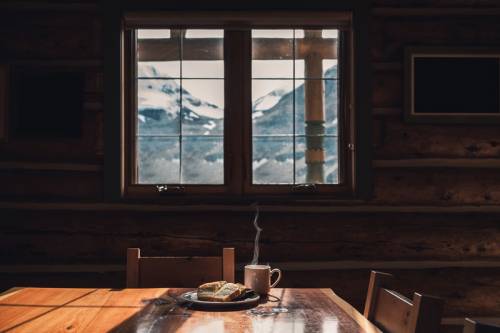 Day 16 | Monday, Dec. 13
Day 16 | Monday, Dec. 13
The song of the bread
But the angel said to them, “Do not be afraid; for see — I am bringing you good news of great joy for all the people: to you is born this day in the city of David a Savior, who is the Messiah, the Lord. This will be a sign for you: you will find a child wrapped in bands of cloth and lying in a manger.” And suddenly there was with the angel a multitude of the heavenly host, praising God and saying, “Glory to God in the highest heaven, and on earth peace among those whom he favors!” — Luke 2:10–14
The cooking instructor ceremoniously pulled the bread out of the fireplace’s beehive oven. It was a proud moment as we looked upon the perfectly shaped loaf with steam rising from its crusty top. He set it on the table and placed his finger in front of his lips. “Hush. Listen. Do you hear it? Do you hear the song the bread sings?” he asked.
If I hadn’t heard the sounds for myself, I would have thought the instructor had gotten into the “sack” — a sherry-like liquor that was popular for cooking in 18th-century kitchens — that we were going to use to flavor our steamed puddings. But I did hear the soft crackling filling the air as the cooling crust of the bread contracted.
“It’s beautiful, isn’t it? Not many people take time to listen to their bread serenading them,” he said.
Later that day, as I took a walk in the crisp air — a wonderful respite from the dark, smoky room where we cooked — I thought about the song of the bread. I had made bread before, but I had never heard it sing. I began wondering what other soft songs God was gracing me with in my life that I had been deaf to.
In a world where there is constant noise — the nonstop humming of appliances plugged into their outlets, the email notifications dinging or buzzing, the message alerts on cellphones, cars driving by — what are the divine sounds trying to soothe our rattled souls?
That day, I not only heard the bread sing. I was also treated to a duet as the cider, fermenting in the tavern’s cellar, fizzed and bubbled. “The singing of the cider was music to the ears of many New Englanders,” the instructor said, explaining that making cider was the only way to keep apples all winter long. Yes, he shared more than his cooking expertise with us; he shared many a quip and lore from the past.
In a quieter time, people would be comforted by these songs, as the cracking and bubbling of bread and cider reassured them that they would neither thirst nor hunger.
I find myself thirsting this Advent. I find myself hungering — not for something to drink or to eat, but for something to satiate an emptiness in my soul. And so this Advent, I will be listening to the songs around me. I will especially be listening for the song of the angels who bring the Good News of great joy as they proclaim, “Glory to God in the highest!” Yes, indeed. Glory to God forevermore.
Pray
Ever-singing God, may we listen this Advent to the divine melodies that are all around us. May our ears tune into the holy rather than the hectic. May we hear the song of the bread, the cider, the birds, the wind and, most of all, the angels. In Jesus’ name, we pray. Amen.
Go deeper
Stop everything you are doing at this moment. Sit with your feet planted firmly on the floor. Take a deep breath. Close your eyes and listen to the sounds around you. What do you hear? What needs to have the volume lowered or turned off: email notifications, phone alerts, etc.? What is a sound you never noticed before? Now commit for the rest of Advent to spend each day listening more carefully to the heavenly songs that are always playing.
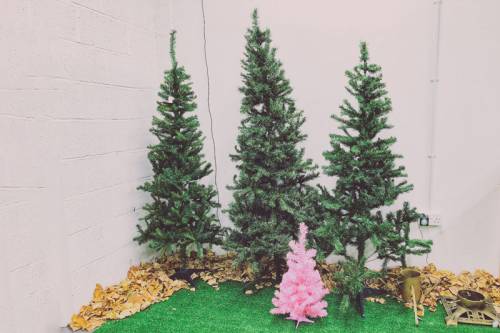 Day 17 | Tuesday, Dec. 14
Day 17 | Tuesday, Dec. 14
The pink tulle Christmas tree
But about that day and hour no one knows, neither the angels of heaven, nor the Son, but only the Father. For as the days of Noah were, so will be the coming of the Son of Man. For as in those days before the flood they were eating and drinking, marrying and giving in marriage, until the day Noah entered the ark, and they knew nothing until the flood came and swept them all away, so too will be the coming of the Son of Man. Then two will be in the field; one will be taken and one will be left. Two women will be grinding meal together; one will be taken and one will be left. Keep awake therefore, for you do not know on what day your Lord is coming. But understand this: if the owner of the house had known in what part of the night the thief was coming, he would have stayed awake and would not have let his house be broken into. Therefore you also must be ready, for the Son of Man is coming at an unexpected hour. — Matthew 24:36–44
It was a relic from the 1960s that my mom was going to throw away, but to my little girl’s eyes, the pink tulle Christmas tree, glistening with red glass ornaments, was the most beautiful thing I had ever seen. I placed the salvaged small tree on my bedside table where, every night, I would hop into bed and gaze at it before turning off the light. It brought me joy as I eagerly counted the days till Dec. 25.
One night, though, as my mom walked by my room, she didn’t see joy in my eyes. Rather she saw tears streaming down my face. She came in quietly and sat by my side. I was staring at the tree and, in the silence of that moment, she looked at it, too, and joked, “I know. The tree is ugly, isn’t it?” Perhaps it is from my mother where I get my poorly placed timing for cracking jokes.
I began crying harder. No, the tears weren’t for the tree. I was anxious about the long division test that we would have to take in school the next day. I wasn’t very good at math, and I was dreading all the problems I would have to solve. I had thought about it so much that I had worked myself into a frenzy, and nothing could calm me — not even staring at the pink tulle Christmas tree.
It was then my mother reminded me of my elderly great-aunt, Frieda was her name, who had lived a long and not always easy life. Widowed for many years and never having any children of her own, she continued to greet each day with faith in God. She refused to let fears overtake her. She insisted on looking for the good even amid the bad. And she would always be thanking God for the littlest things that we just never think to thank God for: the way the butter melted into her bread, “Thank you, God;” the tea she was steeping in a pot, “Thank you, God;” the stray cat that had decided to make a home with her, “Thank you, God.” And on it went throughout Aunt Frieda’s day — counting her blessings, surrendering her worries, always looking up towards the night sky in search of that proverbial bright star what would lead her to her Savior.
“Remember to be like Aunt Frieda, never worrying about what tomorrow will bring. Just lift it up to God in prayer.” With that, my mother kissed my forehead and turned the bedroom light off. My tears stopped falling, and I suddenly noticed something on that pink tulle Christmas tree. Amid all the red ornaments was a golden star that had fallen from the top of the tree and was caught in a lower tulle branch. I reached for the star to put it back in its rightful position.
Howard Thurman once wrote, “We do not know how to deal with that which awaits us tomorrow, and in our desperation and panic we find ourselves unable to center our spirits.”
Aunt Frieda knew how to center her spirit. And after that, I did, too. I placed the star on top of the — now I will admit — gaudy tree. May we all look to the star in the sky that will guide us to our Hope, our Joy, our Strength, our Peace — our Redeemer.
Pray
God of comfort and strength, you tell us to not be afraid of what tomorrow might bring, yet we continue to worry and fret. Our minds race to all the “what if’s” and to all the things that might happen. Ease our fears as we recognize the time we waste thinking of things that might not happen. Bring peace to our fainting hearts. In Jesus’ name, we pray. Amen.
Go deeper
Think about how you handle life’s worries and problems. Do you meet them with a calm assurance that all will be well? Challenge yourself this Advent to meet every worry with this simple affirmation: “God is with me — now and forever.”
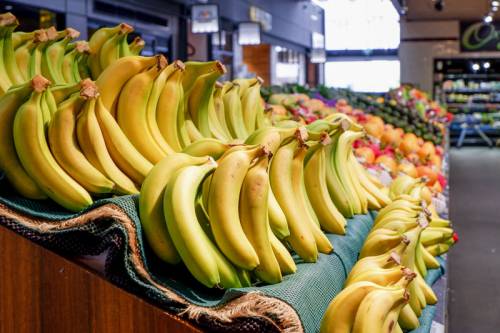 Day 18 | Wednesday, Dec. 15
Day 18 | Wednesday, Dec. 15
Green bananas
Praise the Lord! How good it is to sing praises to our God; for he is gracious, and a song of praise is fitting. The Lord builds up Jerusalem; he gathers the outcasts of Israel. He heals the brokenhearted, and binds up their wounds. He determines the number of the stars; he gives to all of them their names. Great is our Lord, and abundant in power; his understanding is beyond measure. The Lord lifts up the downtrodden; he casts the wicked to the ground. — Psalm 147:1–6
My neighbor, Borg, a Swede whose woodworking skills helped secure him a lucrative living over the years, was moving out of Vermont to South Carolina. It was time to go, he said. The cold winters were no longer treating his old joints favorably.
A few days before he moved, I saw him on the trail that runs behind my house and many farms throughout the little village that I call home. He was standing in front of a pond, watching his beaver friends busily swimming about and building a new home. “I will miss them. I’ve always come down here to watch them,” he said. “But it is time for me to live life again.”
I could understand what he was saying. The COVID-19 pandemic had disrupted many lives, not only putting plans on hold, but also altering plans completely, especially for those who now had to forge new lives without a loved one by their sides. The year had been tiring, frustrating and depressing. For Borg, though, his desire to live again went deeper than the painful waiting of hopes delayed. Borg spoke quietly as he admitted his struggle with “long COVID” — the lingering effects of the coronavirus that some people experience, which can include a loss of taste, brain fog, headaches and extreme tiredness.
Borg’s long COVID was so long that it led to a deep depression, which led to that fateful day last December where he kissed his wife goodbye before setting out into the woods for a walk in the falling snow. “What my wife didn’t realize is I had no intention of coming back home,” he said, now shaking his head in disbelief that he was even thinking about ending his life. Friends eventually searched and found him. He was sitting on a rock by the edge of the beaver pond, sobbing. They brought him home.
“But I now buy green bananas,” he said wistfully, explaining that when COVID-19 started, he had stopped buying them. He didn’t have hope that tomorrow would come. “So why bother buying bananas if they might not get a chance to ripen?” he shrugged. I nodded to show I understood all too well.
Ever since that conversation with Borg, I find myself stopping in front of the green bananas in the grocery store. I stop and wonder, “How strong is my faith that tomorrow will not only come, but come bearing the hope we need?”
“All around us worlds are dying, and new worlds are being born,” wrote Howard Thurman, observing that hope in the moments of despair can be found in “the extra breath from the exhausted lung, the one more thing to try when all else has failed, the upward reach of life when weariness closes in upon all endeavor.”
Borg is emerging from his long COVID. He is even buying green bananas again. I know this to be true because before he left for South Carolina, he placed on my front step a loaf of banana bread made with all the fruit he had purchased that he had indeed lived to see ripen.
Pray
God of our days, renew our fainting spirits, for we are tired of living in a pandemic world. Whenever there does seem to be a glimmer of hope, it dims all too quickly. But you, O God, are bringing light back into the world, and it is a light that you promised will never dim. We hold on to that promise. In Jesus’ name, we pray. Amen.
Go deeper
Buy the greenest bananas you can find and display them prominently in your home. May the sight of them make you pause and ponder just how strong your faith is in the beautiful tomorrow God will bring — and then be prepared to turn them into loaves of banana bread to share with others.
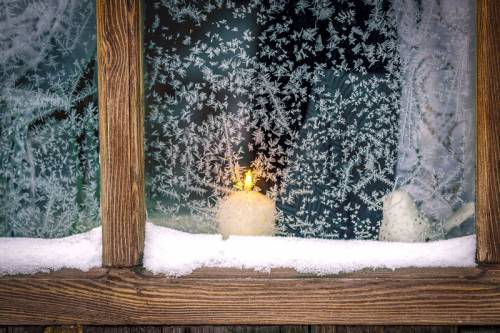 Day 19 | Thursday, Dec. 16
Day 19 | Thursday, Dec. 16
Candles in the window
In the beginning was the Word, and the Word was with God, and the Word was God. He was in the beginning with God. All things came into being through him, and without him not one thing came into being. What has come into being in him was life, and the life was the light of all people. The light shines in the darkness, and the darkness did not overcome it. — John 1:1–5
Dusk was descending quickly, but I put my sneakers on anyway, thinking I had enough time to get a run in before supper. I was wrong. The path before me was getting harder to see. I picked up the pace trying to get back home before complete darkness enveloped the woods. There wasn’t anything to really be afraid of. I wasn’t out in the middle of nowhere, and I knew this trail by heart. Still, it was a bit unsettling.
I finally turned off the trail and felt my feet touch the muddy ground of the well-worn cow path that leads back to my house. By now all was dark. The only light guiding me was that of an electric candle that I had placed in my kitchen window, which faces the open field. I never knew how comforting it was to see a flickering light beckoning to me. Imagine how beautiful the sight of a candle in a window was so many years ago for lost and weary travelers when darkness was much harder to chase away without battery-operated flashlights or fully charged cellphones.
The sun had set on our last night of the open-hearth cooking class. We had our candles lit as we broke bread together at the table. In addition to the dripping beeswax tapers on the table, there were also a few in the wall sconces and on the fireplace mantle. But that night we were going to have guests for dinner: the participants of the tinsmithing class that had been running concurrently with ours. To greet them, we set to work placing candles in all the tavern’s windows so that they would cast a long stream of light on the path leading up to the tavern.
Candles have long been placed in windows as a sign of welcome. Some folklore has it that the tradition began when priests were outlawed from practicing their faith in parts of the United Kingdom. The priests would have to secretly meet with their flock, and so the faithful began lighting candles in their windows as a sign it was safe to enter in and visit. Of course, putting a lighted candle in the window was also a way to guide loved ones home safely or to serve as a beacon of welcome to a stranger in need of a place to stay. Sometimes, too, candles would be lit and placed in a window when someone died, or when a baby was born.
In his book, “The Mood of Christmas,” Howard Thurman tells the story of a “desert dweller” who always placed a lighted lantern alongside the road to “cheer the weary traveler.” The desert dweller wasn’t just offering light on the journey, but a note next to the lantern provided detailed directions to his cottage, “just in case” a person needed shelter, company or bread to eat.
Are there candles in your windows to welcome a lost and weary world? Better yet, is there a lantern with a note that needs to be set out this Advent season — a light and an invite to someone who might need you “just in case”?
Pray
Illuminating God, you are always beckoning us to come ever closer to you. Forgive us when we grope along life’s paths. Overwhelmed by the darkness of our own despair and doubt, we fail to see your divine light shining bright and shining always. Open our eyes. Help us to see that you are there for all our “just in case” moments. In Jesus’ name, we pray. Amen.
Go deeper
If candles in windows aren’t part of your holiday décor, consider placing some to brighten the winter evenings. Better yet, seek to create a “prayer window.” Choose a window in your home and place a candle on its sill year-round, lighting it nightly with a prayer for God’s light to shine upon those who are walking in darkness.
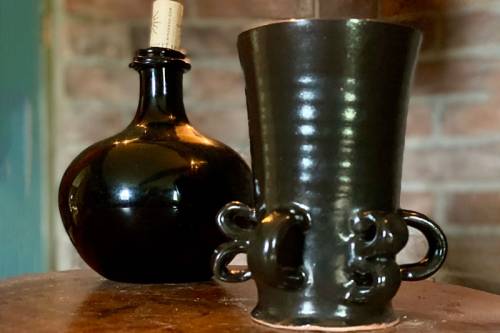 Day 20 | Friday, Dec. 17
Day 20 | Friday, Dec. 17
One cup, many handles
For just as the body is one and has many members, and all the members of the body, though many, are one body, so it is with Christ. For in the one Spirit we were all baptized into one body — Jews or Greeks, slaves or free — and we were all made to drink of one Spirit. Indeed, the body does not consist of one member but of many. — 1 Corinthians 12:12–14
I removed the silver chalice from the communion table and placed my strange looking mug — the one with many handles — in the center next to the bread that we would break for the sacrament. The mug was going to serve as the common cup, and there could not have been a more fitting illustration for the “one body, many members” message I was going to preach.
I first encountered this uniquely designed mug with many handles while putting the dishes away in the old pantry of the tavern I was staying in during the open-hearth cooking class. I fell into the role of dishwasher during my time there and didn’t mind the task at all. I found it meditative, swishing my hands in the warm water that filled the wash tin.
One night, as I reached to place a bowl on the top shelf, I spotted the mug. It was bizarre looking, and my curiosity led me to ask about it. Of course, my cooking instructor, knowledgeable in all things from the past, knew all about the mug.
It was a “tyg” or sometimes spelled “tig.” The large pottery cup was a popular design from the 15th to the 17th centuries. Often, they were fashioned with three handles, but some had up to nine all around the body of the mug. The many handles were made so that hot drinks could be passed easily to all of those seated around a table without burning one’s hands. I found the concept of the tyg powerfully moving. That is, after I moved past the reality that such a cup would be the perfect germ spreader in times of plagues — back then, bubonic; and today, coronavirus variants.
I held the tyg in my hand and thought of the many times I had lifted the cup of salvation during the celebration of the Lord’s Supper, the sharing of one cup and one loaf for all. Yet throughout history, how many times have that one loaf and one cup been withheld from someone? When seated at the table with strangers, how easily shared is our cup of love, of hope, of hospitality and of understanding?
I thought of my cooking companions and how each one of us, while so very different, were brought together by our common love for cooking over open fires. We came as strangers, learned to love (or put up with) each of our idiosyncrasies, and left as friends.
I now have a tyg of my own. Last Christmas, my husband found a reproduction of one online and surprised me with it under our tree. It now sits on my desk where I write, reminding me how we really do need one another. And on occasion, it graces the communion table, serving as the perfect illustration of being one in Christ.
Howard Thurman once wrote, “It is a great and blessed fortune that our lives are never left to themselves alone.”
“We are visited in ways that we can understand and in ways we cannot understand, by great moments of inspiration and quiet reassurances of grace. These quiet things enrich the common life and give to the ordinary experiences of our daily grind a significance and a strength that steady and inspire,” he said.
I am looking forward to the day when I can once again pass my tyg around in a post-COVID-19 world. Till then, there are many other ways I can seek to be one with God and with the community God calls me into.
Pray
Community-shaping God, you ask for us to live peaceably with one another, sharing our bread, our wine and our resources freely with our siblings. Forgive us when we are hesitant to pass the cup of grace to others. Forgive us when we keep that common cup away from others. May our hearts open to the message of the season, that we are not meant to go through life alone. Emmanuel, God with us, is indeed with us — asking that we make room in our lives for strangers to become friends. In Jesus’ name, we pray. Amen.
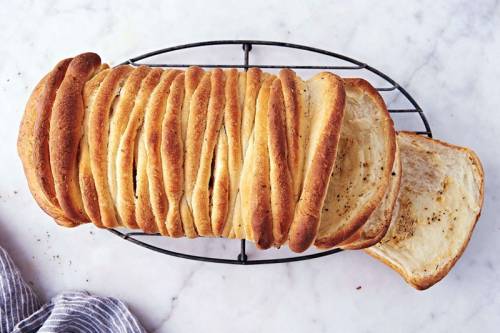 Cheddar Cheese Pull-Apart Bread
Cheddar Cheese Pull-Apart Bread
We will prepare our bread for the fourth Sunday of Advent with “Emmanuel, God with us,” in mind, pondering how we are never alone. And what better way to capture the idea of community in bread than with a “pull-apart” loaf, which is sometimes called “monkey bread” or “bubble bread.” Often these recipes are sweet, but today we will whip up a savory loaf. And if you don’t have time to bake, no worries. An easy way to create a pull-apart bread is to take ready-made biscuits and nestle them side by side in a round pan. Sprinkle cinnamon, sugar and butter on top for a sweet treat; or layer with shredded cheese. Remember, to make an extra loaf to share with someone who might need to be reminded that they are not alone in this world. Christ is coming. Hope is being born. Neighbors and friends still care. Go to: kingarthurbaking.com/recipes/cheddar-cheese-pull-apart-bread-recipe
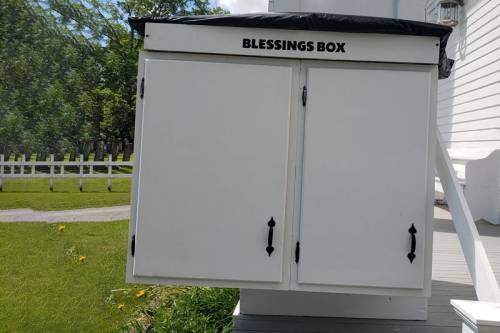 Day 21 | Saturday, Dec. 18
Day 21 | Saturday, Dec. 18
The real blessing in a box
Then the king will say to those at his right hand, “Come, you that are blessed by my Father, inherit the kingdom prepared for you from the foundation of the world; for I was hungry and you gave me food, I was thirsty and you gave me something to drink, I was a stranger and you welcomed me, I was naked and you gave me clothing, I was sick and you took care of me, I was in prison and you visited me.” — Matthew 25:34–36
It took two years to get a “blessing box” on the property of the little rural church I serve. Why did it take so long to get an idea that seemed easy and straightforward off the ground? There were many conversations as to where this 24/7 food pantry should be placed. Some in the congregation felt that such a box, filled with nonperishable food items and toiletries for people who might need them, should not be outside in the harsh elements of rain, wind and snow. Rather, place the box inside and make it available on Sunday mornings so that folks could come and see how pretty the sanctuary is.
I gently remarked that putting a blessing box inside the church would defeat the purpose of this ministry. “We want to reach out, not draw in,” I said.
Finally, it was agreed to have the box outside, but not on the side of the rural road. The box now sits on the church’s front porch, which one gets to by driving up a long hill. Is it any surprise that it is not being used?
Many times, when we seek to feed others, our good intentions wind up putting more obstacles in the way of the hungry. Our hearts might be filled with love and concern for God’s hurting world, but even the most woke and generous heart still has a bit of self-preservation beating inside. Whether we want to admit it or not, many times the things we do come with an expectation of what we will get back in return. “Will this blessing box encourage people to come and be part of our congregation?” is the silent question floating among the congregation of 23 people.
Will we ever be truly selfless in our care for others? Perhaps not. Perhaps that is something we will always have to work on. Perhaps that is the tension we will need to accept as we constantly challenge ourselves to be Christ to others?
Howard Thurman recognized this tendency to give with strings attached to the gift, writing, “When I ask myself why I try to help others, what reply do I get? Is it merely an effort on my part to build up my own sense of significance?”
Thurman remembers a trip to Myanmar years ago when, while walking on a road, he noticed water and fruit left at intervals along the way. He later learned the water and fruit were left by Buddhist priests to bless anyone who passed by. The priests weren’t looking for new converts. They weren’t looking to be thanked. They just wanted to bless a stranger on a journey, not caring about who they were, what their religion was or even if they had a great need.
“Giving is no longer an offering merely of money or time or services, viewed as a sacrifice or a cause for merit, recognition or glory,” said Thurman. “It is a simple sacrament, involving all of a person as their spirit moves through the swinging door of need into the very citadel of another’s spirit.”
During Advent, may the obstacles we place before serving others be removed, and may our blessing boxes, whatever they might be, move from the safety of our sacred sanctuaries and be placed out into the world.
Pray
Provider God, we are getting closer to Bethlehem, the House of Bread, where we will fall on our knees and pay homage to the Christ Child who sleeps in a feeding trough. As we continue our journey, may our hearts grow more generous, seeing clearly and then removing the many stumbling blocks we create when seeking to reach out to those who need a blessing. In Jesus’ name, we pray. Amen.
Go deeper
Before writing a check to the church or dropping off canned goods to a food pantry, ask yourself: “What are some other ways I can engage with a hurting world? How can I enter the lives of those who are hungry, really taking time to hear their stories?”
